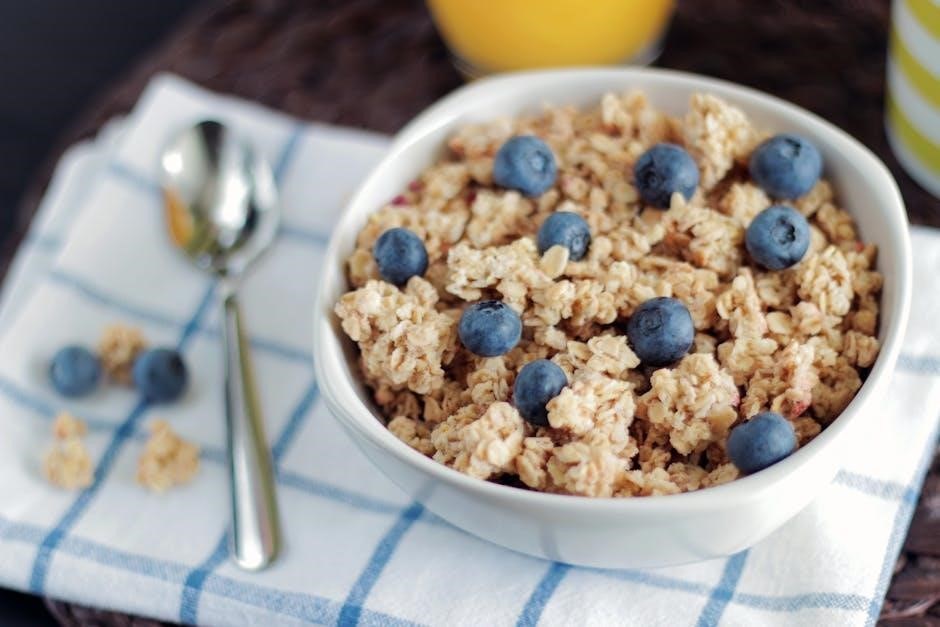This structured 7-day meal plan is designed to optimize athletic performance, recovery, and hydration. Tailored for athletes, it ensures balanced macronutrients, proper caloric intake, and nutrient-rich meals for peak results.
Overview of the Importance of Nutrition for Athletes
Nutrition plays a fundamental role in an athlete’s performance, recovery, and overall success. A well-designed meal plan ensures adequate energy levels, supports muscle repair, and enhances endurance. Proper fueling helps athletes optimize their training, compete at higher intensities, and recover faster. Balanced macronutrients, including carbohydrates, proteins, and fats, are essential for sustained energy and muscle maintenance. Hydration and electrolyte balance are equally critical to prevent fatigue and maintain physical function. A structured approach to nutrition not only improves physical outcomes but also supports mental clarity and focus. For athletes, nutrition is not just about eating enough calories but about consuming the right foods at the right times to meet specific energy demands. By prioritizing nutrient-dense meals, athletes can achieve peak performance, reduce injury risks, and maintain long-term health. A tailored meal plan addresses these needs, ensuring athletes are fueled for success.
Key Objectives of the Meal Plan
The primary objectives of this 7-day meal plan are to optimize energy levels, enhance recovery, and support overall athletic performance. It focuses on delivering the right balance of macronutrients—carbohydrates, proteins, and fats—to fuel workouts and aid muscle repair. The plan emphasizes proper hydration and electrolyte management to prevent fatigue and maintain peak physical function. Additionally, it aims to provide meals that are nutrient-dense, easy to prepare, and adaptable to individual needs. By adhering to this structured approach, athletes can maintain consistent energy levels, reduce recovery time, and improve mental focus. The meal plan also encourages long-term health by promoting sustainable eating habits. Overall, its goal is to serve as a practical guide for athletes to achieve their performance goals while nourishing their bodies effectively.

Understanding the Daily Nutrition Needs of Athletes
Athletes require tailored nutrition to meet high energy demands, support muscle recovery, and maintain optimal performance. Proper caloric intake, macronutrient balance, and hydration are crucial for fueling workouts and preventing fatigue.

Caloric Intake and Energy Requirements
Athletes need personalized caloric intake based on factors like sport, intensity, and weight. A typical plan ranges from 1,600 to 2,500 calories daily, ensuring energy for performance and recovery. Meals are timed to prevent energy crashes, with balanced snacks every 3-4 hours. For high-intensity sports, additional calories may be necessary to sustain endurance. Proper calorie management helps maintain strength and agility, while avoiding excessive intake prevents fatigue. The meal plan includes post-workout meals to replenish energy stores, supporting muscle repair and growth. Adequate hydration complements calorie intake, ensuring optimal bodily functions. Each day’s meals are structured to meet specific energy needs, with adjustments based on individual requirements and performance goals.

Macronutrient Balance: Carbohydrates, Proteins, and Fats
Athletes require a balanced intake of carbohydrates, proteins, and fats to fuel performance and support recovery. Carbohydrates, the primary energy source, are emphasized in meals, with a focus on complex carbs like whole grains and vegetables. Proteins are essential for muscle repair and growth, with recommendations of 1.2–2.2 grams per kilogram of body weight daily. Lean meats, fish, eggs, and legumes are key protein sources. Healthy fats, including omega-3s, are included to support hormone production and overall health. The meal plan ensures a macronutrient distribution of 50–60% carbs, 20–30% protein, and 20–25% fats. Each meal is designed to provide sustained energy, aid recovery, and maintain muscle function. This balanced approach ensures athletes meet their nutritional needs for optimal performance and long-term health.
Hydration and Electrolyte Management
Proper hydration and electrolyte balance are critical for athletic performance and recovery. Athletes should aim to drink 17–20 ounces of water 2–3 hours before workouts and 7–10 ounces every 10 minutes during exercise. Electrolytes, such as sodium and potassium, are essential for maintaining fluid balance and nerve function. The meal plan incorporates water-rich foods like fruits and vegetables, as well as electrolyte-rich beverages and snacks, such as coconut water and bananas, to replenish lost salts. Avoiding sugary drinks and monitoring urine color for optimal hydration levels are also emphasized. Staying hydrated enhances endurance, prevents cramps, and supports overall physical function, making it a cornerstone of the 7-day meal plan for athletes.

Structure of the 7-Day Meal Plan
The 7-day meal plan is designed to provide a balanced and organized approach to nutrition, focusing on daily meal goals, hydration, and practical tips for optimal performance.
Day 1: Breakfast, Lunch, Dinner, and Snacks
- Breakfast: Scrambled eggs with spinach, whole-grain toast, and a banana. This provides protein, fiber, and essential vitamins for energy.
- Lunch: Grilled chicken salad with mixed greens, cherry tomatoes, cucumber, and a light vinaigrette. Pair with quinoa for sustained carbs.
- Snacks: Apple slices with peanut butter and a handful of almonds. These offer quick energy and healthy fats.
- Dinner: Baked salmon with sweet potato wedges and steamed broccoli. Salmon provides omega-3s, while sweet potatoes offer complex carbs.
This balanced day ensures adequate protein, carbs, and fats to fuel workouts and support recovery.
Day 2: Balanced Meals for Optimal Performance
- Breakfast: Greek yogurt with mixed berries, granola, and a splash of honey. This combination provides protein, fiber, and natural sugars for sustained energy.
- Lunch: Grilled chicken wrap with whole-grain tortilla, hummus, lettuce, and sliced cucumber. Pair with a side of baby carrots for added vitamins;
- Snacks: Mixed nuts and a protein smoothie with spinach, banana, and almond milk. These snacks maintain energy levels and support muscle repair.
- Dinner: Pork medallions with roasted asparagus and quinoa. This meal balances lean protein, complex carbs, and healthy fats for recovery and performance.
This day focuses on maintaining energy, supporting muscle function, and ensuring a balanced intake of nutrients to enhance athletic performance and recovery.
Day 3: High-Protein Recipes for Muscle Recovery
- Breakfast: Scrambled eggs with turkey bacon, spinach, and whole-grain toast. This meal provides essential amino acids and fiber for muscle repair and sustained energy.
- Lunch: Grilled salmon with quinoa and steamed broccoli. Salmon is rich in omega-3 fatty acids, which reduce inflammation and support recovery.
- Snacks: A protein shake with whey protein, almond milk, and a handful of almonds. This snack boosts protein intake and maintains energy levels.
- Dinner: Chicken stir-fry with brown rice and mixed vegetables. This meal balances lean protein with complex carbs for optimal recovery and performance.
Day 3 emphasizes high-protein meals to aid in muscle recovery and growth, ensuring athletes can perform at their best while supporting their body’s repair processes.
Day 4: Focus on Complex Carbohydrates
- Breakfast: Oatmeal with sliced bananas, almond butter, and a splash of low-fat milk. This meal provides sustained energy and fiber.
- Lunch: Grilled chicken breast with roasted sweet potatoes and green beans. Sweet potatoes are rich in complex carbs and vitamins.
- Snacks: Whole-grain crackers with hummus and a side of mixed berries. These snacks offer a blend of carbs and protein.
- Dinner: Baked cod with quinoa and steamed asparagus. Quinoa is a complete grain, providing both carbs and essential amino acids.

Day 4 focuses on complex carbohydrates to provide sustained energy and support muscle function. Meals are designed to balance carbs with lean proteins and fiber, ensuring athletes maintain peak performance and recovery.

Day 5: Incorporating Healthy Fats
Day 5 emphasizes the inclusion of healthy fats to support energy levels, heart health, and nutrient absorption. Breakfast features scrambled eggs with avocado, spinach, and whole-grain toast, topped with a sprinkle of nuts. For lunch, grilled salmon (rich in omega-3s) is paired with quinoa, roasted vegetables, and a drizzle of olive oil. Snacks include Greek yogurt with chia seeds and berries, providing a mix of fats and fiber. Dinner consists of lean beef stir-fried with broccoli, bell peppers, and a side of brown rice. Healthy fats like avocados, nuts, and olive oil are integrated throughout the day to ensure sustained energy and recovery. This focus on fats complements the meal plan’s balanced approach, avoiding quick sugar spikes while promoting overall wellness.

Day 6: Meal Timing and Frequency
Day 6 focuses on optimizing meal timing and frequency to maintain energy levels and support performance. Athletes are advised to eat smaller, balanced meals every 3-4 hours to avoid energy crashes. Breakfast includes oatmeal with nuts and fresh fruit, providing sustained carbs and healthy fats. A mid-morning snack of Greek yogurt with honey and berries offers quick energy. Lunch features grilled chicken breast, brown rice, and steamed vegetables for a balanced mix of carbs, protein, and fiber. An afternoon snack of apple slices with peanut butter supports muscle recovery. Dinner includes baked salmon, quinoa, and roasted asparagus, emphasizing omega-3s and complex carbs. A light evening snack, like cottage cheese, aids in overnight recovery. Proper hydration and electrolyte intake are stressed throughout the day to maintain performance and prevent fatigue.
Day 7: Final Adjustments for Peak Performance
Day 7 focuses on fine-tuning your nutrition strategy to ensure peak performance. Start with a high-protein breakfast, such as scrambled eggs with spinach and whole-grain toast, to fuel your morning. For lunch, opt for lean grilled turkey with quinoa and mixed vegetables, providing sustained energy and recovery support. A mid-afternoon snack of mixed nuts and dried fruit offers a quick energy boost. Dinner should feature omega-3 rich foods like grilled salmon, paired with sweet potatoes and steamed broccoli, to enhance recovery and reduce inflammation. Adjust portion sizes based on your activity level and goals. Prioritize hydration throughout the day, aiming for at least 8-10 glasses of water; Electrolyte-rich beverages or coconut water can be included post-workout to replenish lost salts. Fine-tune your meals to reflect your body’s response, ensuring you’re optimally fueled for your next challenge.

Additional Tips for Athletes
Prioritize hydration by drinking water regularly throughout the day, and avoid going more than four hours without a balanced meal or snack to maintain energy levels and performance consistency.
Pre- and Post-Workout Nutrition Strategies
Proper nutrition before and after workouts is crucial for maximizing performance and recovery. Aim to eat a balanced meal or snack 1-3 hours pre-workout, focusing on complex carbs and lean proteins. Post-workout, prioritize protein intake within 30-60 minutes to aid muscle repair and recovery. Hydration is also key—drink water throughout the day and consider electrolyte-rich beverages during and after intense sessions. Snacks like Greek yogurt with berries or a protein smoothie are ideal post-workout options. Avoid heavy, high-fat meals pre-workout to prevent digestive discomfort. Tailor your strategy based on individual energy needs and workout intensity to optimize results.
- Pre-workout: Oatmeal, bananas, or energy bars are great choices.
- Post-workout: Protein shakes, eggs, or grilled chicken with whole grains.
Snack Ideas for Quick Energy
Athletes need snacks that provide quick energy while supporting overall nutrition goals. Fresh fruits like bananas or apples are excellent choices, offering natural sugars and fiber. Greek yogurt with berries combines protein and carbs for sustained energy. Nuts and seeds, such as almonds or chia seeds, are rich in healthy fats and calories. Protein bars or energy bars can be convenient but opt for options with minimal added sugars. Hard-boiled eggs, trail mix, or whole-grain crackers with peanut butter are also great snacks. For hydration and electrolytes, consider coconut water or sports drinks. Snacks should be light, easy to digest, and consumed 30-60 minutes before or after workouts. Portion control is key to avoid overeating while maintaining energy levels.
- Fresh fruits (bananas, apples, berries)
- Greek yogurt with honey or nuts
- Nuts and seeds (almonds, chia seeds)
- Energy bars (low sugar)
- Trail mix with dried fruits
- Whole-grain crackers with peanut butter
Meal Prep and Grocery List Essentials
Meal prep is a cornerstone of maintaining a consistent 7-day meal plan for athletes, ensuring meals are readily available and nutritionally balanced. Start by planning meals for the week, listing all required ingredients, and organizing them into a structured grocery list. Focus on whole foods, lean proteins, complex carbohydrates, and healthy fats. Staples include chicken, fish, eggs, whole grains, fruits, vegetables, nuts, and seeds. Hydration items like water, coconut water, and electrolyte-rich drinks are also crucial. Batch cooking meals like grilled chicken, quinoa, and roasted vegetables saves time and ensures consistency. Portion control is key to meet caloric and macronutrient needs. Adjust the list based on dietary preferences, such as plant-based or low-carb options. A well-organized grocery list and meal prep routine simplify the process, helping athletes stay on track with their nutrition goals throughout the week.
- Proteins: chicken, fish, eggs, tofu
- Carbohydrates: brown rice, oats, sweet potatoes
- Fats: avocados, nuts, olive oil
- Fruits and vegetables
- Hydration essentials

Expert Advice and Considerations
Consult a registered dietitian to customize the meal plan for individual needs, ensuring optimal performance and recovery. Prioritize hydration, electrolyte balance, and whole foods for sustained energy and health benefits.
- Hydration and electrolyte management are critical for performance.
- Adjust portions based on activity level and goals.
- Incorporate a variety of whole, nutrient-dense foods.
- Plan meals around training schedules for best results.
Customizing the Meal Plan for Individual Needs
Customizing the 7-day meal plan for athletes is essential to meet specific dietary requirements and performance goals. Factors such as age, weight, activity level, and dietary preferences should be considered. For example, endurance athletes may require more carbohydrates, while strength athletes might need higher protein intake. Adjust portion sizes based on caloric needs, ensuring adequate fuel for workouts and recovery. Incorporate personal food preferences to maintain adherence to the plan. For female athletes, considerations like menstrual cycle phases and iron intake may be necessary. Vegetarian or vegan athletes should focus on plant-based protein sources. Consulting a registered dietitian can help tailor the plan further, ensuring it aligns with individual health and training objectives. This personalized approach maximizes benefits and supports long-term success.
- Adjust macronutrient ratios based on training type and goals.
- Account for personal preferences to enhance adherence.
- Consider special dietary needs, such as vegetarian or vegan diets.
- Seek professional guidance for precise customization.
Addressing Special Dietary Requirements
When creating a 7-day meal plan for athletes, it’s crucial to accommodate special dietary needs to ensure inclusivity and effectiveness. Vegetarian and vegan athletes can benefit from plant-based protein sources like legumes, tofu, and quinoa. Gluten-free options should be incorporated for those with celiac disease or intolerance, such as brown rice, oats, and gluten-free grains. Dairy-free alternatives like almond milk and coconut yogurt are ideal for lactose-intolerant athletes. Additionally, halal and kosher dietary requirements must be respected, ensuring all meats and ingredients comply with religious guidelines. For athletes with food allergies, such as nut or shellfish allergies, careful substitution of ingredients is necessary. Registered dietitians can play a key role in tailoring the meal plan to meet these specific needs, ensuring athletes receive optimal nutrition while adhering to their dietary restrictions.
- Include plant-based proteins for vegetarian and vegan diets.
- Offer gluten-free and dairy-free alternatives.
- Respect halal and kosher dietary requirements.
- Substitute ingredients for common food allergies.